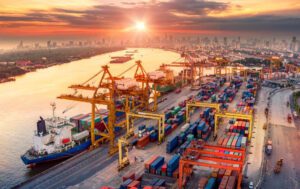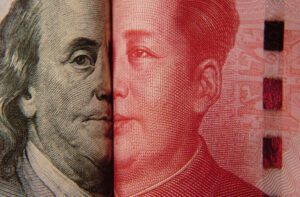Event Video: WITA Pop-Up Briefing on the Section 301 Tariff Review
On May 14, the Office of the U.S. Trade Representative (USTR) announced the long-awaited review of the Section 301 tariffs first imposed by the Trump Administration.
Earlier today, on May 17, WITA hosted a pop-up briefing to discuss the 301 review, and what it means for impacted sectors of the U.S. economy, and trade relations between the U.S. and China.
Featured Speakers:
Nova Daly, Senior Public Policy Advisor, Wiley Rein LLP
Albert Gore, Executive Director, Zero Emission Transportation Association
Ed Gresser, Vice President and Director for Trade and Global Markets, Progressive Policy Institute
Kyle Johnson, Director of Trade Policy, Information Technology Industry Council (ITI)
Scott N. Paul, President, Alliance for American Manufacturing
Vanessa Sciarra, Vice President, Trade & International Competitiveness, American Clean Power Association
Maria Zieba, Vice President of Government Affairs, National Pork Producers Council
Moderator: Nicole Bivens Collinson, Managing Principal, Operating Committee, and International Trade and Government Relations Practice Leader, Sandler, Travis & Rosenberg, P.A.
05/17/2024 | Washington International Trade Association
Intelligent Unilateralism: An Integral Part of the Response to Growing Geopolitical Rivalry
Governments are considering their best response to the return of overt geopolitical rivalry and, in some cases, lethal conflicts. While some talk of forming formal or informal blocs of like-minded nations, many governments simply don’t want to pick sides. Even those that do can act unilaterally.
All the talk of imposing new trade and investment restrictions—often in the name of promoting economic security—may have led officials and analysts to overlook one constructive unilateral option. Namely, strengthening the national and regional business environment so as to enable local firms to adapt to adverse circumstances and opportunities that geopolitical events create.
Here the case is made for Intelligent Unilateralism as a (partial) insurance policy against geopolitics.
As geopolitical rivalry intensifies, the siren song of insular, zero-sum thinking gains in prominence. This flies in the face of decades of experience where our standards of living have been enhanced by doing business with foreign buyers and sellers. Exports augment national sales and make jobs more secure. Import competition keeps local firms on their toes—complacent local oligopolists tend to rip off citizens.
No country in the past half a millennium has become an economic superpower by its economy being hermetically sealed to outsiders. Yet, even for economies as large as Japan, there is still the question: How best to react as China and the United States vie for primacy?
For better or for worse, at least since the global financial crisis, the world is in an era of trade policy unilateralism. The painstaking monitoring of commercial policy by the Global Trade Alert has shown this. Sadly, there remains no appetite for path breaking multilateral opening of markets.
04/22/2024 | Simon J. Evenett | Global Trade Alert
Overcapacity at the Gate
China’s National People’s Congress (NPC) concluded in March 2024 with an explicit focus on industrial policy favoring high-technology industries, and very little fiscal support for household consumption. This policy mix will compound the growing imbalance between domestic supply and demand. Systemic bias toward supporting producers rather than households or consumers allows Chinese firms to ramp up production despite low margins, without the fear of bankruptcy that constrains firms in market economies.
So far, policymakers in Brussels and other advanced economies have mostly fretted over excess capacity in clean technology sectors, including electric vehicles, solar modules, and wind turbines, which have already seen supply-demand imbalances in China for years. However, indications of rapid production expansion across many more sectors have emerged since 2021, as Beijing sought to boost growth with supply-side policies during and after the pandemic. The situation underscores a systemic problem, not confined to specific sectors, which will set China on course for a trade confrontation with the rest of the world.
Saturation Point
The simplest and most widely accepted definition of overcapacity is when factories’ production capacity is under-utilized. While temporary overcapacity can be harmless and a normal part of market cycles, it becomes a problem when it is sustained through government intervention. Structural overcapacity happens when companies maintain or grow their unused capacity without worrying about making a profit (or a loss), often due to a lack of economic pressure to operate efficiently, like a hard budget constraint.
China has a long history of structural overcapacity. Its last severe episode happened in 2014-2016, a few years after the government launched a massive stimulus package in response to the 2008-09 global financial crisis. The program, centered on infrastructure and property construction, triggered significant capacity build-up in a range of associated industries. In 2014, as demand for property and infrastructure construction weakened, overcapacity became evident in heavy industry products such as steel and aluminum.
03/26/2024 | Camille Boullenois, Agatha Kratz & Daniel H. Rosen | Rhodium Group
Ain’t No Duty High Enough
On Thursday, May 23, WITA and the Asia Society Policy Institute will host a free webinar titled “From 25 to 100: New Tariffs on Chinese EVs”. Information can be found here and below.
The European Commission is likely to impose countervailing duties on imports of electric vehicles (EV) from China in the coming months to head off the risk of subsidized cars damaging Europe’s auto industry. We expect the Commission to impose duties in the 15-30% range. But even if the duties come in at the higher end of this range, some China-based producers will still be able to generate comfortable profit margins on the cars they export to Europe because of the substantial cost advantages they enjoy. Duties in the 40-50% range—arguably even higher for vertically integrated manufacturers like BYD—would probably be necessary to make the European market unattractive for Chinese EV exporters. As countervailing duties at this level are unlikely, policymakers in Brussels may decide to turn to non-traditional tools to shield the European auto industry, including restrictions based on environmental or national security-related factors.
The EU’s Anti-Subsidy Probe
In the biggest EU trade case against China ever, the Commission initiated an anti-subsidy investigation into EV imports from China in October 2023. Should it determine that China-based producers have benefited from subsidies in ways that harm EU-based manufacturers, it could place provisional countervailing duties on China-origin EV imports anytime from now until July 3, and final duties by early November. In March 2024, the Commission asked European customs authorities to track imports of EVs from China, a signal that it could impose provisional duties in the near future.
The EV probe stands out for several reasons. First, the Commission initiated the investigation ex officio, without a formal complaint from industry, which is a rarity in such cases. Second, there is a divide within Europe’s car industry—which accounts for 7% of the EU’s GDP and 8.5% of its manufacturing employment—on the desirability of the probe. German carmakers, which are heavily reliant on the Chinese market, oppose it out of fear that Beijing could retaliate against them, while French counterparts, which are far less exposed to China, support it. Third, the probe is based on the threat that cheap EV imports from China could cause damage to European manufacturers in the future, rather than an assessment that this damage is already taking place. Finally, the probe is perhaps the most political case of its kind in recent memory. Commission President Ursula von der Leyen chose to announce it in her annual state of the union speech last September. And the Commission has focused its investigation on three China-based carmakers—BYD, Geely, and SAIC—rather than western carmakers like Tesla, which exports more EVs from China to the EU than any other producer.
04/29/2024 | Gregor Sebastian, Noah Barkin & Agatha Kratz | Rhodium Group
The Twilight of US Trade Leadership

Following is an excerpt from an article by Claude Barfield, published by the American Enterprise Institute in February.
In November 2023, trade officials capped years of a trade policy vacuum by failing to reach an agreement on the trade portion of its signature economic initiative in Asia, the Indo-Pacific Economic Framework for Prosperity (IPEF). The embarrassing debacle only reinforced Asian views that the United States is an ‘unreliable’ economic partner.
While deeper social and economic shifts have contributed to the United States reaching a low point in trade leadership, the proximate political event was Trump’s election in 2016.
Abetted by advisers who either knew better or were ideological cranks, such as economic adviser Peter Navarro, Trump’s ‘America First’ trade policy was guided by the president’s personal whims and false longstanding conclusions about postwar US trade policy. These false conclusions include the notion that trading partners — rather than US consumers and businesses — pay for tariffs, trade policy is the main factor influencing the US trade balance or that the World Trade Organization (WTO) always rules against the United States.
Two decisions in particular were damaging for strategic and economic reasons: withdrawal from the Trans-Pacific Partnership and the spurious invocation of a national security rationale to levy tariffs on steel and aluminium imports, even against US allies.
US officials have refused to accept a WTO decision that the tariffs violated international trade rules. Meanwhile, in the Asia Pacific, nations have negotiated new regional agreements, such as the Comprehensive and Progressive Agreement for Trans-Pacific Partnership (CPTPP) and the Regional Comprehensive Economic Partnership agreement. These agreements have spurred increased trade flows and investment, leaving the United States behind.
Initially advanced by the United States, the CPTPP was the first major trade agreement to include an e-commerce chapter. Beijing is now pressing to join the CPTPP and though members can slow down the application, China may achieve its goal in the future.
Under Biden, the United States adopted a conciliatory tone toward US allies. Yet Biden continued many of Trump’s worst policies, including the so-called ‘national security tariffs’ and dawdling over proposals to restart the WTO dispute settlement process, which had been hampered by the Trump administration’s refusal to allow the appointment of new WTO Appellate Body judges — a stance continued by the Biden administration.
02/16/2024 | Claude Barfield | American Enterprise Institute
WITA – We put the community in trade community.
Information about upcoming WITA and trade community events





